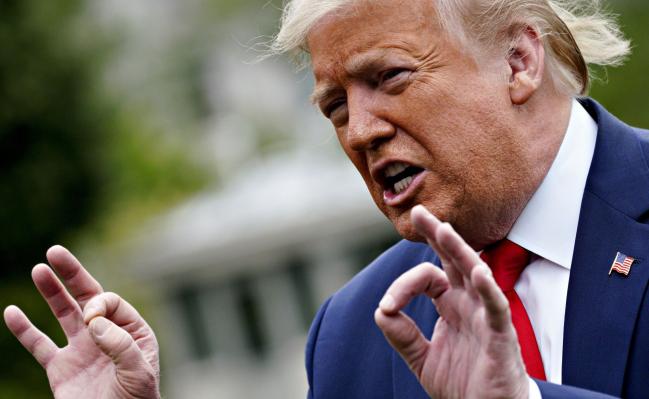(Bloomberg) -- President Donald Trump said the U.S. could pursue a “complete decoupling from China” in response to unspecified conditions, his most forceful statement yet on the souring ties with Beijing.
In a tweet Thursday, Trump refuted comments a day earlier by U.S. Trade Representative Robert Lighthizer, who said a full decoupling of the world’s two biggest economies was not “a reasonable policy option.”
The tweet comes a day after Secretary of State Mike Pompeo met with Chinese official Yang Jiechi, amid questions over whether the nations’ trade pact will remain in tact. According to Pompeo, Yang said China is committed to maintaining agriculture purchases that were crucial to Trump’s support of the deal.
Meanwhile, Trump’s former national security adviser, John Bolton, has cast new light on the deal by alleging that Trump told Chinese counterparts to help him win re-election by buying more U.S. farm products.
Trump has also ramped up his rhetoric against Beijing as the coronavirus pandemic continues to spread in the U.S. Trump refers to the illness as the “plague from China,” and has accused the country of withholding important information in the early days of the outbreak.
“I think the trade deal is a great deal. But ever since we got hit with the Chinese plague, I feel different toward everything having to do with China. And I’ve always been hardline on China,” he told the Wall Street Journal during an interview on Wednesday.
Lighthizer told a congressional hearing on Wednesday that he believes U.S. supply chains should be brought back from China, but that the countries’ economies should remain intertwined.
“This issue of decoupling is a complicated one. Do I think supply chains should be brought back? Yes. Do I do think they should be brought back from China? Yes. Do I think they should be brought back from everywhere else? Yes,” Lighthizer said.
“Do I think that you can sit down and decouple the United States economy from the Chinese economy? No, I think that was a policy option years ago,” he added. “I don’t think it’s a policy -- a reasonable policy option at this point.”
©2020 Bloomberg L.P.

